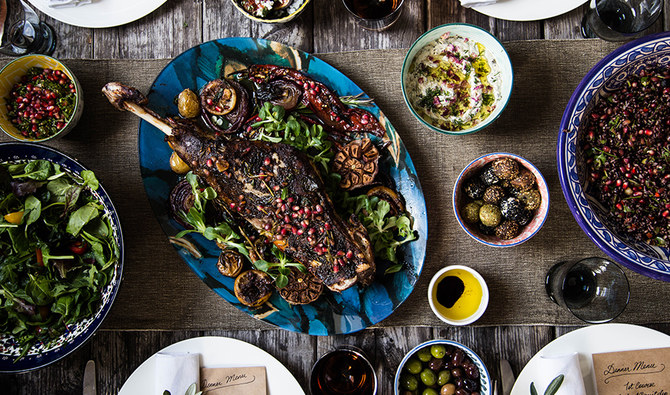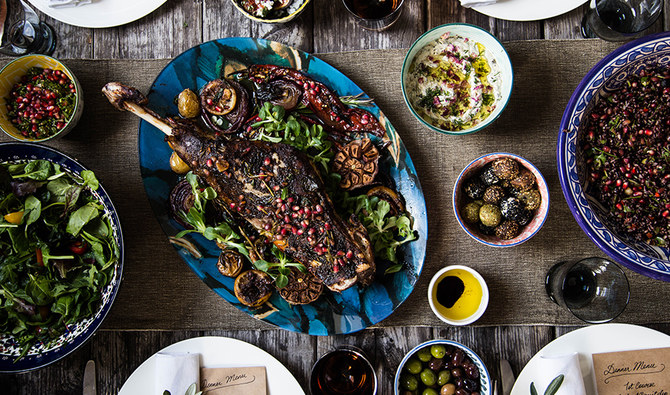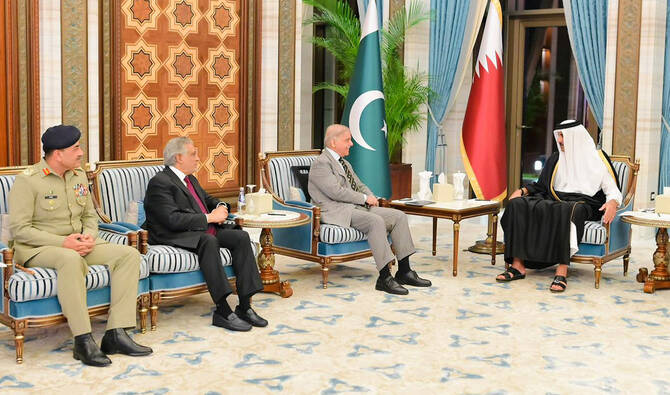LAHORE: No chef’s hat, no white jacket-- Saima Khan moved from table to table in her black jeans, apron and Veja sneakers, greeting every guest personally on Monday evening for a charity fundraising dinner at fashionable new pop-up restaurant, ‘Fred,’ in the heart of Lahore.

Saima Khan in her kitchen at home in Hampstead, London in 2019. (Saima Khan photo)
The simply curated space was packed with some of Pakistan’s biggest businesspeople, artists, actors and philanthropists, the tables a messy menagerie of olive branches, colorful mezze dips, legs of lamb, bright red pomegranates, chicken sprinkled with Iranian rose petals, gold-tipped saffron rice and the wafting scent of orange blossom. There were no courses and no formal waiters for the Persian feast. It was good old fashioned eating, the buzz of chatter rising louder than the music, people eating with their hands and laughing with their mouths full.
From the corner of the room, the chef looked at her party and smiled. She had traveled a long, long way-- from Tokyo to Sydney, Zurich to New York-- to finally land in Lahore and cook for the first time in the home her parents had left 50 years ago.
Saima Khan was born to Pakistani immigrant parents in London, where she was brought up and now lives. Though always a creative cook and host to her friends, Khan was a high flying commodities trader and investment banker for 20 years, moving her life from country to country with her work.

Khan creates beautiful and simply curated dining experiences with a focus on Middle-Eastern, Persian, Nordic and Scandinavian cuisine for her catering company, 'The Hampstead Kitchen,' in London. (Saima Khan Photo)
But in February 2012, a chance meeting with billionaire Warren Buffett in a remote airport lounge in Nebraska changed the course of her life.
“Our conversation turned to relationships, the meaning of life... and food. I told him I make a mean chicken karahi he should try. He told me he’d take me up on the offer,” Khan said with a laugh in her voice.
Of course, she didn’t expect he was serious. She couldn’t have known that in the years that followed, she would come to know “Warren” — as one of her dearest friends and mentors.
Two weeks after the airport meeting, Khan got a call from Buffett’s secretary asking to set up a time for the home-cooked dinner she’d offered.
“It was bizarre. My first thought was...somebody is joking with me. But I hadn’t told a soul I’d met Warren except for my parents,” Khan said.
On the day of the dinner, in her small lower east side apartment in New York City, Khan worked alone, preparing wheat batter for fresh chapatis, tarka daal, chicken karahi, achari gosht, chicken biryani and other staple Pakistani dishes. She brought out her old Pakistani table runners, napkins and fabrics. Nusrat Fateh Ali Khan played softly in the background. And then she received another phone call.
This time it was Buffett himself, asking if it was okay to bring a couple of his friends along.

Kitchen preparations with Saima Khan adding the final garnish to her creations in Lahore. Jan 20, 2020. (AN Photo)
“I told him, I’ve cooked enough food for 20 people! Bring whoever you like,” Khan said.
But when she opened the door that evening, she wasn’t expecting the faces on the other side. Crowding her narrow doorway with Warren and Astrid Buffett... were a smiling Bill and Melinda Gates.
“At one point in the evening, Bill sauntered into my tiny kitchen and asked for ‘makhan’ with his chapati. You realize after a while, it doesn’t matter who they are. People are just people in the end... and there’s nothing like good food to truly connect with them,” Khan said.

Garnished saffron rice ready to be served in Lahore by celebrity chef Saima Khan. Jan. 20, 2020. (Saima Khan photo)
On that April evening, breaking bread around her small table with four of the richest people in the world, Khan had unknowingly opened the doors to a brand new life.
“Warren asked me if I would consider catering a dinner for 20 people a month later at his home in Palo Alto. I said sure!” Khan smiled as she reminisced.
In May, when Khan stepped into the room to meet the nearly two dozen guests she had just single-handedly cooked a Pakistani feast for, she saw her table crowded with very familiar faces.
That night, Khan was chef to the Obamas, the Clintons, the Zuckerbergs, Brad Pitt, Angelina Jolie and Ariana Huffington among others. Her menu: food without borders. An ode to true Pakistani food and the spirit of sharing, simplicity and soulful dining. Served in her own clay crockery, with chipped plates for character and a deliciously mismatched setting, she encouraged everybody to get their hands dirty and just dig in-- Pakistan style.

Olive branches, pomegranates and aubergines served as simple and rustic decor for dinner hosted by celebrity chef Saima Khan in Lahore. Jan. 20, 2020 (Saima Khan photo)
Since then, as founder and chef with her London-based catering company ‘The Hampstead Kitchen,’ Khan has cooked for various heads of state, celebrities and royals. She has been private chef numerous times for the royal families of Qatar and other royal families of Europe, she’s served up her creations in palaces around the world, in the White House, in swanky private jets and celebrity weddings.
And yet, she remains at her heart, a British girl with a bit of Punjab still in her soul. Behind the scenes in the kitchen on Monday, Khan broke into spontaneous bhangra dance moves while garnishing the lamb. In the chaos, she made people laugh even as she commanded quiet respect, she whizzed around the kitchen scattering handfuls of pomegranates and rose buds over her exquisite creations-- and in her speech, she told her guests how proud she was of her Punjabi heritage, of its culture of food where people regularly ate from a single plate.
“That’s what sharing a meal is all about,” she said. “It’s about peace, love and kindness.”

Ready to be served at a fundraising dinner in Lahore, Saima Khan's famous "Obama dip" named by first lady Michelle Obama when it was served at the White House. Jan 20. 2020 (AN Photo)
Khan primarily cooks Middle-Eastern, Persian, Scandinavian and Nordic food-- all cultures where food-sharing is encouraged and loved.
In London, she now employs almost a hundred people. But every single person on Khan’s payroll is either a former refugee, a former convict or formerly homeless men and women-- with almost 70 percent of all proceeds from her bustling business going to charities around the world.
In Pakistan, Khan supports a host of charities and runs three free schools built on land from her father’s village near Gujranwala-- a city just north of Lahore known for its wrestlers and its food.
“I always want to give something back to my ancestral homeland, because we took something from its soil... my father,” she said with a smile.
Late that evening, after the guests had long gone, Khan spoke in Punjabi to her 72-year-old father over the phone in her unrelenting British accent.
“I might have fallen in love with Lahore,” she told him. “Even my Punjabi’s got better.”
Softly, his proud laughter escaped the phone, spilling into her kitchen-- a final garnish to the chef’s homecoming.













